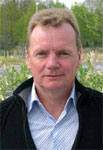Monday April 7th :
Adaptive Reliable Chips – Reconfigurable Computing in the Nano Era
Jürgen Becker, Karlsruhe Institute of Technology – KIT, Germany
Biography:
 |
Prof. Dr.-Ing. Jürgen Becker
Karlsruhe Institute of Technology - KIT
Dept. Electrical Engineering & Information Technology
Institute for Information Processing - ITIV
Engesserstr.5
D-76128 Karlsruhe
Germany
phone : +49 721 / 608-2502 (-2503 – Secr.)
fax : +49 721 / 608-2925
email : becker@kit.edu |
Jürgen Becker is Full Professor for Embedded Electronic Systems in the department of Electrical Engineering and Information Technology at Universität Karlsruhe (TH). His actual research is focused on industrial-driven System-on-Chip (SoC) integration with emphasis on adaptivity, e.g. dynamically reconfigurable hardware architecture development and application in automotive and communication systems. Prof. Becker is Head of the Institute for Information Processing (ITIV) and Department Director of Electronic Systems and Microsystems (ESM) at the Computer Science Research Center (FZI). From 2001- 2005 he has been Co-Director of the International Department at Universität Karlsruhe (TH). He is author and co-author of more than 180 scientific papers, and active as general and technical program chairman of national / international conferences and workshops. He is executive board member of the german IEEE section, Board member of the GI/ITG Technical Committee of Architectures for VLSI Circuits, Associate Editor of the IEEE Transactions on Computers, and Senior Member of the IEEE. Since October 2005 Prof. Becker is Vice-President ("Prorektor") for Studies and Teaching at Universität Karlsruhe (TH).
Tuesday April 8th :
Emerging concepts in non-volatile memory technologies – Era of resistance switching memories
Christophe Muller, Ecole Polytechnique Universitaire de Marseille – Université de Provence, France
Christophe Muller was born in Metz, France in 1970. He received the Ph.D. degree in 1996, from the University Joseph Fourier in Grenoble, France. His Ph.D. thesis was focused on fast oxygen ion conductors for application in gas sensors and solid oxide fuel cells. In 1997, he joined L2MP at the University of South Toulon Var (France) to develop studies on phase transitions in ferroelectrics and field-induced reorientation of ferroelectric domains. He has managed the ferroelectrics group in L2MP for several years and has initiated research activities on integrated ferroelectric thin films for memory applications (FeRAM) in a close industrial partnership. This activity aimed the identification and comprehension of failure mechanisms of FeRAM devices under various stresses (voltage, temperature, ionizing radiations…). He was nominated as Professor in 2003 and joined Polytech' Marseille in September 2007. He is currently at head of the "Memories" team in IM2NP, with a specific interest on the programming mechanisms and reliability performances of emerging non-volatile memory technologies. He contributes to European projects focused on resistance switching memories integrating either complex magnetic nanostructures (thermally assisted MRAM) or bi-stable resistive materials (OxRRAM and CuTCNQ-based memory technologies). The research activity he is straightforwardly managing specifically targets the correlation between the memory cell reliability and the degradation of electrical and microstructural properties of functional materials integrated in the storage elements.
Wednesday April 9th - Invited Presentation
From in-Silicon to in-Situ test
Philippe Cauvet, NXP, France
 |
Philippe Cauvet is a senior principal engineer at NXP Semiconductors Caen, France. He received his MS in physics-instrumentation from the “Conservatoire National des Arts et Métiers” in 1989. After several years in the automotive industry, he joined Philips Semiconductors in 1994 as a test engineer for high-speed data converters. He developed advanced test techniques, focusing on solutions for jitter and noise issues, presented in several international conferences, and applied in commercial products. In 2004, he moved to a new group of Philips Semiconductors (now NXP Semiconductors), where he is in charge of the development of advanced techniques for System-in-Package technologies. Regular lecturer in engineering schools and of internal courses, he is the co-director of ISyTest (Institute for System Testing), the joint LIRMM – NXP institute created in year 2006. In this context, his major technical interests are:
Test of mixed-signal blocks embedded in complex systems
Design-for-Test at system (SiP) level
Alternate test methods for RF, mixed-signal and MEMS
Repair, self-calibration and re-configuration of integrated systems
|
